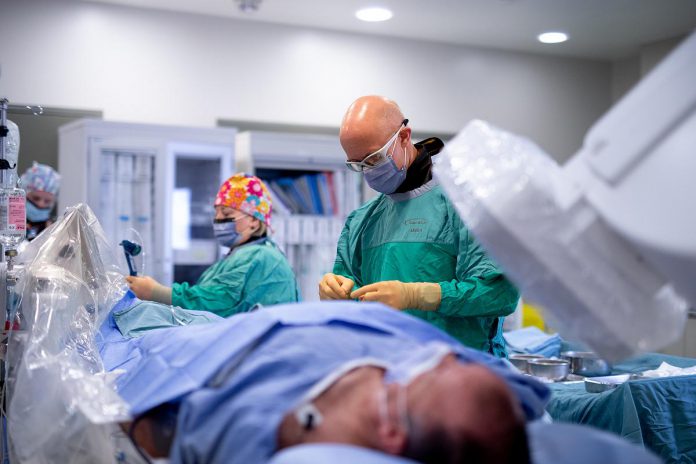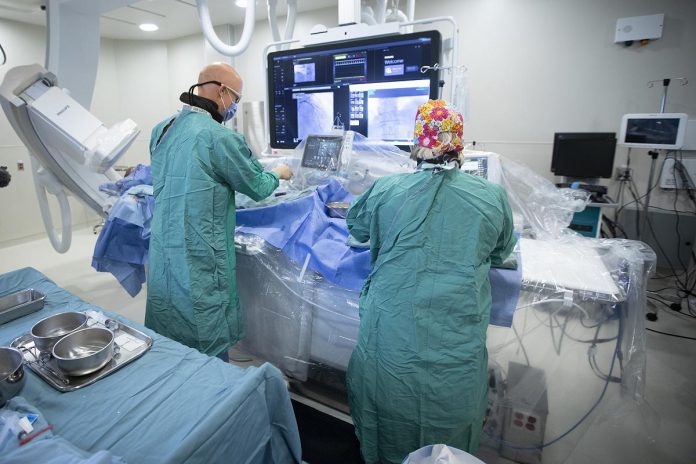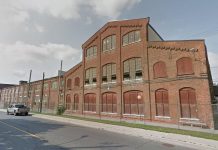
The two cardiac catheterization laboratory suites at Peterborough Regional Health Centre (PRHC) have now been replaced and upgraded, funded by $3.55 million in community donations.
On Tuesday (December 6), the PRHC Foundation announced the successful completion of both their multi-year fundraising campaign and construction on the state-of-the-art “cath lab” suites, which provide life-saving minimally invasive cardiac stenting and diagnosis for patients with heart disease.
Both suites began functioning at full capacity starting earlier this fall. In their first month of operation, there were 324 patient visits, with 279 angiograms and 117 cardiac stenting procedures performed — some while a heart attack was taking place.
“After 14 years of supporting life-saving treatment, we needed to reinvest in PRHC’s cath lab to ensure the future of cardiac care at our hospital,” said Lesley Heighway, PRHC Foundation president and CEO. “Otherwise, patients from across our region might have to be transferred to another hospital hours away at a time when every second counts.”
According to Dr. Warren Ball, interventional cardiologist and head of PRHC’s cardiology division, technology improvements are allowing him and his colleagues to perform minimally invasive cardiac procedures, better and more safely, using tools that did not exist when PRHC opened in 2008.
“The new suites have brought the latest in high-tech imaging right to our fingertips,” Dr. Ball said. “They provide the highest possible definition images to allow interventional cardiologists to accurately diagnose and treat coronary blockages and stop heart attacks, while delivering up to 75 per cent less radiation than the older generation systems.”
VIDEO: New $3.55 million donor-funded Cardiac Cath Lab is keeping all our hearts here
Coronary artery disease is caused by a buildup of fatty deposits (called plaque) on the walls of the artery that can block the flow of blood to the heart. Many people only find out they have the disease when they have a heart attack, which happens to somebody in Canada every seven minutes. Almost 16,000 Canadians die each year as a result of a heart attack — many before they even get to a hospital.
Interventional cardiologists open a blocked artery using percutaneous coronary intervention, commonly called angioplasty, which involves temporarily inserting and inflating a tiny balloon where the artery is clogged to help widen the artery. Angioplasty is often combined with a cardiac stenting procedure, where a small wire mesh tube called a stent is permanently placed in the artery to keep it open and decrease its chance of narrowing again.
PRHC’s cath lab serves patients from the entire region, including Durham, North Hastings, Northumberland, Peterborough, and Peterborough County, and the City of Kawartha Lakes. In 2012, PRHC began offering angioplasty procedures, preventing the need for patients in the region to travel to other hospitals for the treatment.
“The new suites also contain technology to seamlessly integrate multiple complementary imaging tools with bedside controls, dramatically shortening the time required to complete our most complex procedures,” Dr. Ball said. “Access to cardiac care close to home not only saves lives, it saves our patients the time, cost, and stress of travelling to a bigger city centre for cardiac services.”
Heighway said the PRHC Foundation’s fundraising initiative asked supporters to help “keep our hearts here” and that the response was “phenomenal.”
“Donors from across the region stepped forward with gifts of all sizes, making individual donations, corporate gifts, and holding fundraising events in support of this effort,” she noted.

Many people are surprised to learn that, while government funds most of a hospital’s operating costs, it doesn’t fund either upgrades or purchases of new technology or equipment. It’s the support of donors that allows a hospital to acquire state-of-the-art tools and technology — which also attracts the best healthcare professionals to the hospital.
“As our program grows and we build our Cardiac Centre of Excellence, part of that is recruiting new physician experts,” Dr. Ball explained. “The best technology allows us to recruit and keep the brightest new minds that will be the leaders of tomorrow.”
PRHC president and CEO Dr. Peter McLaughlin is thankful for the generosity and support of donors.
“It’s so clear to me as a cardiologist and CEO here at PRHC that it really is the power of philanthropy that makes a vision come to life — in this case a vision of advanced cardiac care at PRHC, serving the patients of this community and this region,” he said.
“We’re immensely grateful for the support of the community,” Dr. Ball added. “The cath lab at PRHC would not exist without you. Whenever PRHC has had a need, the community has been incredibly generous and has stepped up to help.”
Heighway also shared her thanks on behalf of the PRHC Foundation, adding that the hospital’s mission to provide world-class care close to home and the foundation’s mission to support it have never been more important.
“Our world is changing, and health technologies and the needs of our region are evolving,” she said. “Thank you so much to our incredible donors for funding this leading-edge, life-saving reinvestment. Together we’re paving the way for the future of patient care at your hospital and keeping all our hearts here, close to home.”


























